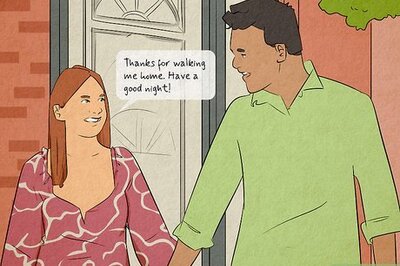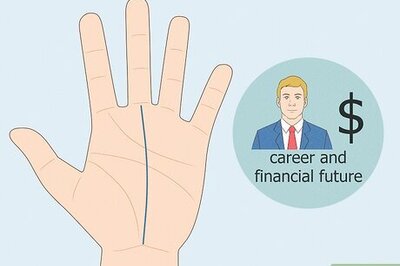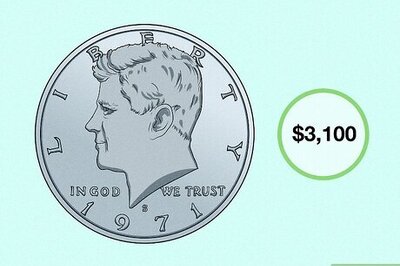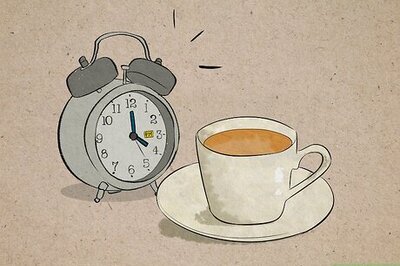
views
In my experience, a film shoot is usually over in the blinking of an eye. Perhaps this is because it is necessarily a focussed endeavour, in order to save precious time and money. As a result there is a constant compression of the spaces in between moments. They too are driven towards making the moments themselves more productive. Shanu Taxi proved no exception.
Akshay, the first assistant director - the master of ceremonies - had planned the toughest scheduled for day two of three. This schedule contained the dreaded airport sequence, for which we had no permissions. The expectation of potential disaster weighed upon us during the first few shots of the night.
These shots were comparatively easy. The taxi had to go up and down Sophia College Lane with the camera placed on its door pointing inwards, as Shanu went through a scene with a passenger who refuses to take his new mobile number on offer. It went smoothly, except for a few stern warnings from patrolling police officers who miraculously stopped short of demanding permission letters.
Finally, judgment day arrived: We neared the international airport, having rehearsed thoroughly what needed to be done. Vikas, who played Shanu, would drive the taxi to a sort of no man's land between the two entrances of the departure terminal. Vikram the cinematographer and I would park in front of them in another car and could film the master shot from inside.
I would be in touch with Takesh, another actor-friend who was part of this climactic scene, via mobile phone, and would tell them when the camera was rolling. I kept wondering if we had rehearsed thoroughly enough. Well, Alea jacta est, I thought - the die is cast. The taxi came to a halt and we rolled camera. Something went wrong and Vikram asked for a retake.
The actors were blissfully going through their motions unawares. I called Takesh and asked for a retake. I remember the nervous tremble in my voice when I gave him the instructions. They followed their orders, and the take went smoothly - Shanu gets out of his side and opens the door for his passenger (played by Takesh) on the same side.
The passenger, already irritable after Shanu's excessive conversation during the journey shows his irritation by getting out from the other side. Shanu, dejected, gets back into the taxi. His passenger comes around and hands him some money. We hold on Shanu as close as possible as he watches his passenger disappear into the distance.
By the end of the take, I kept hearing imaginary whistles from airport security - angry whistles that had caught us in the act. But they were all inside my nervous brain. We did another take. We even got Takesh to walk towards the entrance and got him disappearing into the distance. Then we vamoosed out of there like the successful cons in Hollywood heist films heading for the alps to celebrate with champagne. None of us could believe for the next hour that we had pulled this off.
Any battle hardened film production person will scoff at this description of a teensy weensy film unit overcoming this teensy weensy problem. Film production has a habit of throwing unimaginable woes between the concept and the finished product. Even in the two years that I have spent working in the business I have seen much worse.
Yet, through those times, I never felt the same jitter and fear. I guess that the difference was the sense of propriety I had over my own work as opposed to the work of others. There was also the knowledge that the propriety extends to responsibility when things go wrong. If something had gone wrong, it would have been my neck, not anyone else's.
My respect for directors I have worked for went up one notch. Another lesson from this applies to the larger picture, to the way we go through life. We spend too much time in fear through the anticipation of a problem. Though this is a human trait, it is wasteful and damaging. If one could master one's fear, the bonuses from the resulting equilibrium of thought would tell on all of one's endeavours.
After the airport, everything seemed a bonus. We cheated the close-ups of the climax in the contained environment of Vikram's building's drive, and they turned out rather well. It was five in the morning. A few days ago, Vikram had suggested that we take some shots at the Maratha Mandir cinema, where thousands of taxis park at night. As many cab drivers can be seen washing their source of livelihood there at dawn.
I am sure that each in each profession, people come across moments where they know that it is worth all the toil and burden of their work just to experience them. Making films is hard work. In order to stage an imitation of life, you must work against the grain of life's natural movement. This crafting is a process of attrition, and it strains you, your senses and your body. Yet, in that dawn, when I saw the endless rows of taxis, the legs of the sleeping drivers protruding through their half open doors, the geometry of bonnets and meters lined up unending towards the urban horizon and so many Shanus scrubbing these taxis clean in the half light of daybreak, I walked on air. Meaning seeped into whatever I had done for this film. All that I had understood tacitly in order to write this script was now a discursive understanding. It was not just me who felt this. All of us who were there that morning, elation was on all our faces. Life would move on and the soft dawn would break into a harsh day, but I would keep this memory pristine. I am sure that evoking it one day will get me through a dark night. The shots we got make the opening and closing sequences of the film.
Our good luck sputtered on the third day. The schedule was easy, but the police was far more unforgiving. We were stopped many times, were threatened to be arrested. We were accused of carousing the streets with women at unearthly hours. There were some very severe warnings, and on one occasion, we were 'fined'. But we got through the night, and at 0430 am on the 6th of April, Shanu Taxi was in the can.
Much has happened since. I have almost finished a final cut and a musician cousin of mine laid a good score to it. I hope to have it ready in a few weeks after which I will submit it to as many short film forums as I can. I will judge the response and then send it to as many film festivals as I can. The idea is to get people to see an example of my authorship, to put something out there.
I thank everyone involved in this project for their support and I thank the readership of this blog for their encouragement. For more information on Shanu Taxi, you can see the website: http://web.mac.com/vasantnath
first published:May 03, 2006, 11:41 ISTlast updated:May 03, 2006, 11:41 IST
window._taboola = window._taboola || [];_taboola.push({mode: 'thumbnails-mid-article',container: 'taboola-mid-article-thumbnails',placement: 'Mid Article Thumbnails',target_type: 'mix'});
let eventFire = false;
window.addEventListener('scroll', () => {
if (window.taboolaInt && !eventFire) {
setTimeout(() => {
ga('send', 'event', 'Mid Article Thumbnails', 'PV');
ga('set', 'dimension22', "Taboola Yes");
}, 4000);
eventFire = true;
}
});
window._taboola = window._taboola || [];_taboola.push({mode: 'thumbnails-a', container: 'taboola-below-article-thumbnails', placement: 'Below Article Thumbnails', target_type: 'mix' });Latest News
Shoot and Beyond
In my experience, a film shoot is usually over in the blinking of an eye. Perhaps this is because it is necessarily a focussed endeavour, in order to save precious time and money. As a result there is a constant compression of the spaces in between moments. They too are driven towards making the moments themselves more productive. Shanu Taxi proved no exception.
Akshay, the first assistant director - the master of ceremonies - had planned the toughest scheduled for day two of three. This schedule contained the dreaded airport sequence, for which we had no permissions. The expectation of potential disaster weighed upon us during the first few shots of the night.
These shots were comparatively easy. The taxi had to go up and down Sophia College Lane with the camera placed on its door pointing inwards, as Shanu went through a scene with a passenger who refuses to take his new mobile number on offer. It went smoothly, except for a few stern warnings from patrolling police officers who miraculously stopped short of demanding permission letters.
Finally, judgment day arrived: We neared the international airport, having rehearsed thoroughly what needed to be done. Vikas, who played Shanu, would drive the taxi to a sort of no man's land between the two entrances of the departure terminal. Vikram the cinematographer and I would park in front of them in another car and could film the master shot from inside.
I would be in touch with Takesh, another actor-friend who was part of this climactic scene, via mobile phone, and would tell them when the camera was rolling. I kept wondering if we had rehearsed thoroughly enough. Well, Alea jacta est, I thought - the die is cast. The taxi came to a halt and we rolled camera. Something went wrong and Vikram asked for a retake.
The actors were blissfully going through their motions unawares. I called Takesh and asked for a retake. I remember the nervous tremble in my voice when I gave him the instructions. They followed their orders, and the take went smoothly - Shanu gets out of his side and opens the door for his passenger (played by Takesh) on the same side.
The passenger, already irritable after Shanu's excessive conversation during the journey shows his irritation by getting out from the other side. Shanu, dejected, gets back into the taxi. His passenger comes around and hands him some money. We hold on Shanu as close as possible as he watches his passenger disappear into the distance.
By the end of the take, I kept hearing imaginary whistles from airport security - angry whistles that had caught us in the act. But they were all inside my nervous brain. We did another take. We even got Takesh to walk towards the entrance and got him disappearing into the distance. Then we vamoosed out of there like the successful cons in Hollywood heist films heading for the alps to celebrate with champagne. None of us could believe for the next hour that we had pulled this off.
Any battle hardened film production person will scoff at this description of a teensy weensy film unit overcoming this teensy weensy problem. Film production has a habit of throwing unimaginable woes between the concept and the finished product. Even in the two years that I have spent working in the business I have seen much worse.
Yet, through those times, I never felt the same jitter and fear. I guess that the difference was the sense of propriety I had over my own work as opposed to the work of others. There was also the knowledge that the propriety extends to responsibility when things go wrong. If something had gone wrong, it would have been my neck, not anyone else's.
My respect for directors I have worked for went up one notch. Another lesson from this applies to the larger picture, to the way we go through life. We spend too much time in fear through the anticipation of a problem. Though this is a human trait, it is wasteful and damaging. If one could master one's fear, the bonuses from the resulting equilibrium of thought would tell on all of one's endeavours.
After the airport, everything seemed a bonus. We cheated the close-ups of the climax in the contained environment of Vikram's building's drive, and they turned out rather well. It was five in the morning. A few days ago, Vikram had suggested that we take some shots at the Maratha Mandir cinema, where thousands of taxis park at night. As many cab drivers can be seen washing their source of livelihood there at dawn.
I am sure that each in each profession, people come across moments where they know that it is worth all the toil and burden of their work just to experience them. Making films is hard work. In order to stage an imitation of life, you must work against the grain of life's natural movement. This crafting is a process of attrition, and it strains you, your senses and your body. Yet, in that dawn, when I saw the endless rows of taxis, the legs of the sleeping drivers protruding through their half open doors, the geometry of bonnets and meters lined up unending towards the urban horizon and so many Shanus scrubbing these taxis clean in the half light of daybreak, I walked on air. Meaning seeped into whatever I had done for this film. All that I had understood tacitly in order to write this script was now a discursive understanding. It was not just me who felt this. All of us who were there that morning, elation was on all our faces. Life would move on and the soft dawn would break into a harsh day, but I would keep this memory pristine. I am sure that evoking it one day will get me through a dark night. The shots we got make the opening and closing sequences of the film.
Our good luck sputtered on the third day. The schedule was easy, but the police was far more unforgiving. We were stopped many times, were threatened to be arrested. We were accused of carousing the streets with women at unearthly hours. There were some very severe warnings, and on one occasion, we were 'fined'. But we got through the night, and at 0430 am on the 6th of April, Shanu Taxi was in the can.
Much has happened since. I have almost finished a final cut and a musician cousin of mine laid a good score to it. I hope to have it ready in a few weeks after which I will submit it to as many short film forums as I can. I will judge the response and then send it to as many film festivals as I can. The idea is to get people to see an example of my authorship, to put something out there.
I thank everyone involved in this project for their support and I thank the readership of this blog for their encouragement. For more information on Shanu Taxi, you can see the website: http://web.mac.com/vasantnath

















Comments
0 comment